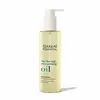What's inside
What's inside
 Key Ingredients
Key Ingredients

 Benefits
Benefits

 Concerns
Concerns

 Ingredients Side-by-side
Ingredients Side-by-side

Olea Europaea Fruit Oil
MaskingVitis Vinifera Seed Oil
EmollientCetyl Ethylhexanoate
EmollientPEG-20 Glyceryl Triisostearate
EmollientPEG-8 Isostearate
EmulsifyingMicrocrystalline Wax
Emulsion StabilisingHippophae Rhamnoides Oil
EmollientCeresin
Emulsion StabilisingSynthetic Wax
AbrasiveOrbignya Oleifera Seed Oil
EmollientDiospyros Kaki Fruit Extract
Skin ConditioningAniba Rosodora Wood Oil
AstringentCitrus Paradisi Peel Oil
MaskingRosmarinus Officinalis Leaf Oil
MaskingTocopheryl Acetate
Antioxidant1,2-Hexanediol
Skin ConditioningBis-Diglyceryl Polyacyladipate-2
EmollientEthylene/Propylene Copolymer
AbrasiveLimonene
PerfumingOlea Europaea Fruit Oil, Vitis Vinifera Seed Oil, Cetyl Ethylhexanoate, PEG-20 Glyceryl Triisostearate, PEG-8 Isostearate, Microcrystalline Wax, Hippophae Rhamnoides Oil, Ceresin, Synthetic Wax, Orbignya Oleifera Seed Oil, Diospyros Kaki Fruit Extract, Aniba Rosodora Wood Oil, Citrus Paradisi Peel Oil, Rosmarinus Officinalis Leaf Oil, Tocopheryl Acetate, 1,2-Hexanediol, Bis-Diglyceryl Polyacyladipate-2, Ethylene/Propylene Copolymer, Limonene
 Reviews
Reviews

Ingredients Explained
These ingredients are found in both products.
Ingredients higher up in an ingredient list are typically present in a larger amount.
Limonene is a fragrance that adds scent and taste to a formulation.
It's found in the peel oil of citrus fruits and other plants such as lavender and eucalyptus. The scent of limonene is generally described as "sweet citrus".
Limonene acts as an antioxidant, meaning it helps neutralize free radicals.
When exposed to air, oxidized limonene may sensitize the skin. Because of this, limonene is often avoided by people with sensitive skin.
The term 'fragrance' is not regulated in many countries. In many cases, it is up to the brand to define this term. For instance, many brands choose to label themselves as "fragrance-free" because they are not using synthetic fragrances. However, their products may still contain ingredients such as essential oils that are considered a fragrance.
Learn more about LimoneneOlea Europaea Fruit Oil is the fixed oil obtained from the ripe fruit of the Olive. In other words - olive oil.
The primary contents of olive oil are glycerides of the fatty acids linoleic, oleic and palmitic.
Olive oil also contains antioxidants such as Vitamin E. Antioxidants may help reduce signs of aging by fighting unstable free-radical molecules. It also contains Vitamins A (retinol), D, and K.
The squalene in olive oil makes it a great emollient. Emollients help soothe and soften your skin by trapping moisture in. This makes olive oil a great skin moisturizer.
Studies show olive oil to have antibacterial and antifungal properties in low concentrations. Another study found olive oil irritated sensitive oily skin. We always recommend speaking with a professional about using this ingredient in your routine.
Due to the fatty acid content, this ingredient may not be fungal-acne safe.
Learn more about Olea Europaea Fruit OilPeg-20 Glyceryl Triisostearate comes from Isostearic Acid and glycerin.
It is an emollient, emulsifier, and gentle cleanser. As an emollient, it helps trap moisture to keep skin soft and hydrated. Emulsifiers help prevent ingredients from separating.
This ingredient is common in oil-based products. This is because it helps oil-ingredients be easily washed away without leaving a residue.
Peg-20 Glyceryl Triisostearate may not be fungal-acne safe.
Learn more about PEG-20 Glyceryl TriisostearateRosmarinus Officinalis Leaf Oil is oil expressed from the leaves of the rosemary plant.
Rosemary Leaf Oil is a fragrance and helps give your product a scent. If you are sensitive to irritating fragrances, this one contains camphor. Camphor has been found to irritate skin.
This oil also contains antioxidant and antimicrobial properties. As an antioxidant, it may protect you skin against damage. This can help slow down the signs of aging.
Learn more about Rosmarinus Officinalis Leaf OilTocopheryl Acetate is AKA Vitamin E. It is an antioxidant and protects your skin from free radicals. Free radicals damage the skin by breaking down collagen.
One study found using Tocopheryl Acetate with Vitamin C decreased the number of sunburned cells.
Tocopheryl Acetate is commonly found in both skincare and dietary supplements.
Learn more about Tocopheryl Acetate